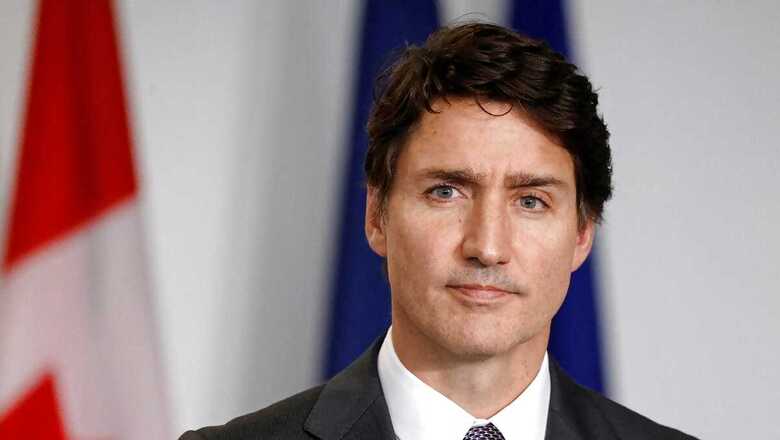
views
Trudeau has destroyed India-Canada ties most irresponsibly. He seems to have little understanding of Canada’s own long-term interests and of geopolitics. As there is democracy in Canada and he is not a dictator, it says a lot also about the narrowness of geopolitical thinking of the larger political, security, economic, media, and academic circles in the country who have remained passive while Trudeau has wilfully corroded India-Canada ties.
Central to Trudeau’s confrontation is Hardeep Singh Nijjar, a man declared a terrorist by India. He has figured on an Interpol Red Corner notice, absconded from India on a forged passport, applied for Canadian citizenship with forged documents, had his application rejected three times, was subject to a no-fly ban in Canada, and was barred from opening a bank account. He also travelled to Pakistan and was photographed there with an AK-47. He has lauded the killing of Mrs Indira Gandhi, of former army chief General Vaidya, of former Punjab Chief Minister Beant Singh, and others, mockingly saying that they had been sent into space. It is this disreputable man who is the cause of the Trudeau-triggered India-Canada rift.
In September 2023, Trudeau said on the floor of the Canadian parliament that they had credible allegations that Nijjar was killed by agents of the Indian government. He made this explosive charge based on “intelligence” but without any “hard evidentiary proof”, as he has now acknowledged on October 16 at the foreign interference inquiry in the Canadian parliament. That any political leader would precipitate a crisis with a major foreign country in such a cavalier manner raises questions about judgement, motives, and external complicity as well.
India’s repeated demands since September 2023 that Trudeau should provide evidence of Indian involvement in Nijjar’s killing have drawn a blank. India has pointed at gang warfare, given drug smuggling, criminal enterprises, and human trafficking by these groups, but this line of investigation seems to have been ignored. Astonishingly, Trudeau has now averred during the foreign interference inquiry that he had told the Indian side that the evidence of India’s involvement lay with the Indian security set-up and that India should cooperate with Canada to unearth it. In other words, he wanted India to provide proof of its involvement in Nijjar’s murder to Canada.
Trudeau also said at the parliament inquiry that after a year they had more “indications” of the involvement of Indian agents from Five Eyes and “South Asian” sources. By “South Asian” one can assume Sikh extremist sources, now that Gurpatwant Singh Pannun has declared that he has been in touch with Trudeau’s office for the last two years or more. Five Eyes sources would essentially be the US, as the US has linked the conspiracy to murder Pannun with Nijjar’s murder, and India has been exhorted quite objectionably by the Americans at the level of Antony Blinken and Jake Sullivan to cooperate with Canada, as this is not a bilateral issue between the US and India.
What is galling in the US position is that not once has the US asked Canada to cooperate with India to address its concerns about the activities of the Canadian Sikh extremists on its soil. These challenge the security, sovereignty, and territorial integrity of India by promoting terrorism, seeking to carve out an independent ethnic Sikh state out of India’s Punjab province, organising referendums to that end, issuing death threats to Prime Minister Narendra Modi, burning his effigies, shoe-slapping them, threatening death to our High Commissioner in Ottawa, glorifying the assassination of Mrs Gandhi, targeting Hinduism and the Hindu community in Canada, etc.
For Trudeau, this is a permissible activity as it falls within “freedom of speech” in Canada. In the parliamentary inquiry, Trudeau said disingenuously that Canada respects India’s sovereignty and territorial integrity, believes in one India, and that India too should respect Canada’s sovereignty. He also said that hate speech was not acceptable. This kind of double-speak is either cynically wilful or Trudeau is incapable of rational thinking.
He is allowing Canadian citizens to mobilise support within Canada for an independent state and still claims Canada supports India’s sovereignty and territorial integrity. As for one-India, with the one-China formula as a diplomatic reference point, Canada has never rejected China’s and Pakistan’s claims on Indian territory. As for not tolerating hate speech, it is almost comical that he does not consider all that has been cited in earlier paragraphs as hate-mongering by Canadian extremists against Indian leaders, diplomats, Hindus, etc.
The outrageous move by the Canadian government to formally declare our High Commissioner and other senior diplomats as “persons of interest” in criminal proceedings and requesting us to lift their immunity was a pure propagandist move, intended to raise the level of confrontation. This has inevitably led to the recall of our six top diplomats from Canada, including our High Commissioner, for security reasons, and the parallel expulsion by India of six top Canadian diplomats, including the Acting and Deputy High Commissioners and four first secretaries.
This amounts to virtually breaking off functional diplomatic ties, as the missions can hardly run without the senior-most diplomats. This will have repercussions on the movement of people, students, tourists, businessmen, etc. This fallout will have longer-term consequences, as it will be difficult to reverse gear. The Sikh community in Canada is large. Even the opposition conservative party cannot ignore its electoral strength. The Canadian security agencies, who have backed Trudeau’s charges about the Indian authorities manipulating the Lawrence Bishnoi gang to plan the killings, would want to prove their case. This is despite the fact that Lawrence Bishnoi is in prison in India since 2014 and some of his principal associates are in Canada. Despite India’s demands that they be arrested, the Canadian government has not done so.
About 20 people have been arrested in the Nijjar case. As the trial begins—and it will be prolonged—the subject of Indian involvement in Nijjar’s murder will be in the news and will generate reactions on both sides, potentially leading to further diplomatic spats, with possible closing of consulates, etc. On the Canadian side, there will be an effort to turn one of the arrested persons into an approver who will then conveniently spill the beans with a view to justifying and legitimising the position taken by the security agencies and the Trudeau government. The Canadian foreign minister has stated that it is not the end of the story and that everything, including sanctions, is on the table. Such threats will only worsen the situation as India will reciprocate in full measure.
The UK may have faith in the Canadian justice system, as stated by the UK foreign office in response to the efforts of Trudeau to mobilise support for Canada from his Five Eyes Anglo-Saxon brotherhood with its roots in the British Empire and American power today, but we need not have such faith, given that the UK has refused extradition of fugitives from Indian justice without any transparency, Canada has not responded to 26 Indian requests for extradition. The US has not moved in 61 extradition cases over the last two decades.
In bilateral joint statements with India, in G20 or G7 statements, there is agreement on rejecting terrorism in all its forms and manifestations, with no cause justifying recourse to terrorism. However, on India-related Sikh extremist terrorism Canada, the US, or the UK do not subscribe to India’s concerns. The UK has activist British Sikh extremists who are courted by UK politicians for electoral and other reasons. The US refuses to curb the American Sikh extremists with freedom of speech as an excuse. So far, the US has not acted against the extremists who fire-bombed our consulate in San Francisco two times. The US authorities are allowing Pannun to spout venom at India with threats to our leaders, parliament, and airlines. The US has also effectively linked the Nijjar and Pannun cases.
At the East Asia summit in Laos, Trudeau proposed that the National Security Advisers of the two countries meet in Singapore to presumably have some understanding that would defuse the issue. It was supposed to be an off-the-record meeting. The Canadian side, in a self-defeating act of bad faith, briefed the Washington Post in London and in New Delhi on the Singapore meeting not only in a twisted manner but insidiously targeted the Home Minister of India in the Nijjar episode. This should normally mean an end to any back channel contacts, which is a very foolish Canadian move.
Trudeau formed a coalition government after the last elections with the New Democratic Party led by Jagmeet Singh, a pro-Khalistan sympathiser whose office displays the photograph of Parminder Singh Parmar, who was responsible for the downing of Air India flight 182 in 1985. Parmar was protected by Pierre Trudeau, Justin Trudeau’s father. It would seem that the son has inherited the political legacy of his father in what might seem to be a genetic political disorder. His wokeness is a contributory factor in his approach to minority groups. Jagmeet Singh has now walked out of the coalition, and Trudeau is now heading a minority government. His poll numbers are falling. For his political survival, he is continuing to court the Sikh vote, which is critical in some constituencies, in the belief that supporting the “Khalistani” cause can yield electoral dividends.
For us, if Justin is Just-out, it will not be a bad thing.
Kanwal Sibal is a former Indian Foreign Secretary. He was India’s Ambassador to Turkey, Egypt, France and Russia. Views expressed in the above piece are personal and solely that of the author. They do not necessarily reflect News18’s views.














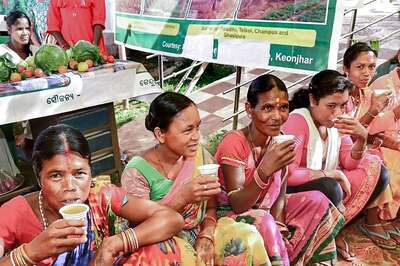

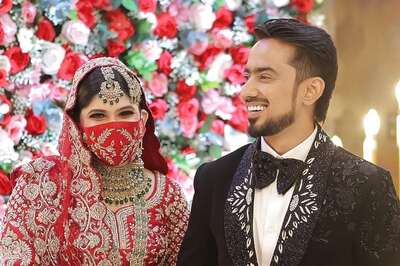
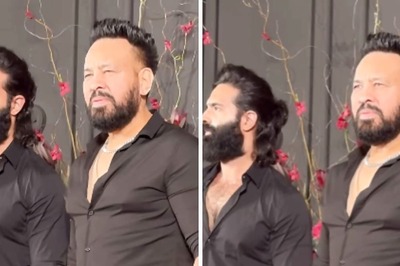
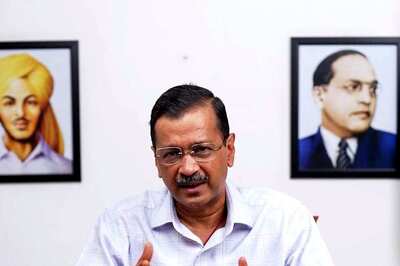

Comments
0 comment